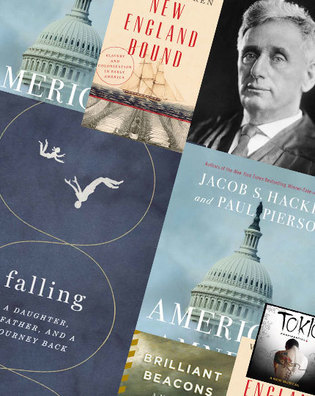 loading
loading
Arts & CultureOutputTo have your book, CD, app, or other work considered for Output, please send a copy to Arts Editor, Yale Alumni Magazine, PO Box 1905, New Haven CT 06509; or e-mail a copy or link to yam@yale.edu.  View full imageFalling: A Daughter, a Father, and a Journey Back Sometimes parenthood is a gentle continuum; sometimes it’s punctuated by tectonic shifts. For children’s book writer and illustrator Cooper, the earth crumbles when, while attending a Chicago Cubs game with his almost-five-year-old daughter Zoë on his lap, “I feel a bump” under her ribs. The bump turns out to be a Wilms tumor, a potentially deadly malignancy in her kidney. What follows is a haunting memoir of three years of treatment and waiting for the hoped-for, prayed-for, word: clear. “She got better, I got worse. Or, at least, different,” Cooper writes, in an unforgettable account of a journey back to solid ground.
Louis D. Brandeis: American Prophet The souls of Old Testament prophet Isaiah and founding father Thomas Jefferson were alive and well in Louis Dembitz Brandeis, the Supreme Court justice who served from 1916 to 1939 and whose influence endures. In a fine “condensed study,” Rosen, a legal scholar and elegant writer thoroughly in the Brandeis tradition, argues that the jurist, who routinely railed against “the curse of bigness” in government and business, is the Jeffersonian who offers “a unifying vision of liberty and democracy for our divided age”—and, in the prophetic tradition, a way out of the political wilderness.
American Amnesia: How the War on Government Led Us to Forget What Made America Prosper While much in this political season has defied predictability, one thing is almost certain: claims that government is not the solution but the problem. Those claims are wrong, say Hacker and Pierson, whose previous book, Winner-Take-All Politics, explored the political reasons for increasing income inequality. In a cogent analysis of a “mass historical forgetting,” the writers show how the public–private hybrid of the “mixed economy” has led to a “constructive and mutually beneficial tension between markets and government” and “made us the richest nation the world has ever seen.”
New England Bound: Slavery and Colonization in Early America “Slavery and colonization went hand in hand,” writes Princeton historian Warren. But while Northerners often view this “deadly symbiosis” as strictly a Southern problem, Warren shows persuasively that “the tragedy of chattel slavery—inheritable, permanent, and commodified bondage”—was in fact a fixture in the New England colonies “from the very beginning.” When John Winthrop told his Massachusetts-bound congregation in 1630 about building a “citty upon a hill,” at least some of the construction workers would likely be enslaved Africans and Native Americans.
Brilliant Beacons: A History of the American Lighthouse “The sea is a dangerous place, and the greatest dangers loom closest to shore,” writes Dolin. Since the first lighthouse in the Colonies was built in 1716 to help sailors avoid shipwreck in Boston Harbor, a “necklace of beacons” has been developed by the federal government to “guide mariners safely to their destination.” Dolin illuminates the technology, the challenges—often from war and storms—and the keepers, who, at no small cost to themselves, kept the lights on.
Tokio Confidential: A New Musical Schorr wrote the book, lyrics, and music for Tokio Confidential, a full-length musical theater piece that had an Off-Broadway run in 2012. Set in 1879, its story of a young American widow who travels to Japan and meets a tattoo artist allows for ruminations about life, death, art, and more-than-skin-deep beauty. The lyrics get philosophical, but the quick-paced score (arranged for a theater orchestra with Asian-style percussion and the three-string lute-like shamisen) keeps this cross-culture body-art exploration lively.
The comment period has expired.
|
|